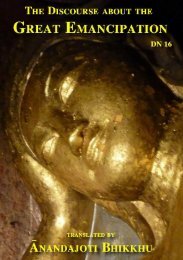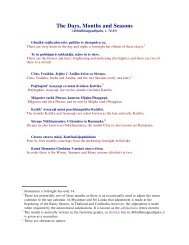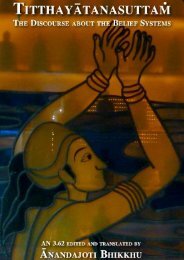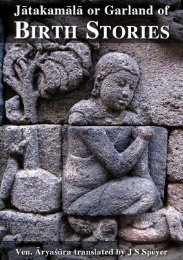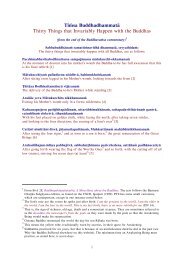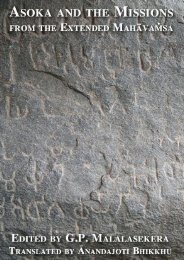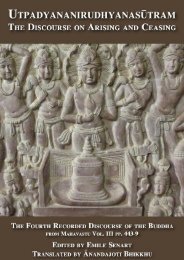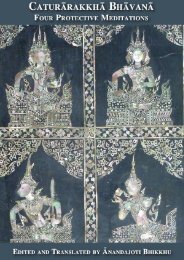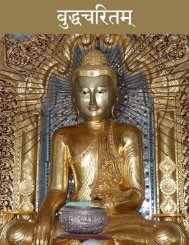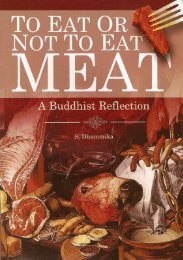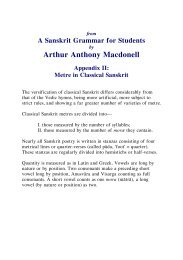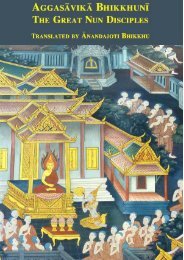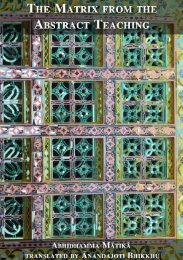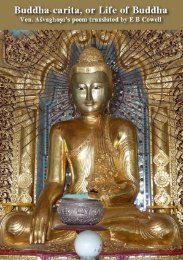MahÄkhandhako The Great Chapter - Ancient Buddhist Texts
MahÄkhandhako The Great Chapter - Ancient Buddhist Texts
MahÄkhandhako The Great Chapter - Ancient Buddhist Texts
You also want an ePaper? Increase the reach of your titles
YUMPU automatically turns print PDFs into web optimized ePapers that Google loves.
II. Progress of the Sāsana - 105<br />
“Taṁ kiṁ maññatha vo kumārā katamaṁ nu kho tumhākaṁ varaṁ:<br />
“What do you think of this, young men, what is better for you:<br />
yaṁ vā tumhe itthiṁ gaveseyyātha, yaṁ vā attānaṁ gaveseyyāthā” ti<br />
that you should search for a woman, or that you should search for yourselves” 162<br />
“Etad-eva Bhante amhākaṁ varaṁ yaṁ mayaṁ attānaṁ gaveseyyāmā.” ti<br />
“This is better for us, venerable Sir, that we should search for ourselves.”<br />
“Tena hi vo kumārā nisīdatha Dhammaṁ vo desessāmī.” ti<br />
“<strong>The</strong>n, young men, be seated, I will teach the Dhamma to you.”<br />
“Evaṁ Bhante” ti kho te bhaddavaggiyā sahāyakā,<br />
“Certainly, venerable Sir,” said that group of good friends,<br />
Bhagavantaṁ abhivādetvā ekam-antaṁ nisīdiṁsu.<br />
and after worshipping the Gracious One, they sat down on one side.<br />
Tesaṁ Bhagavā anupubbikathaṁ kathesi,<br />
<strong>The</strong> Gracious One spoke about the gradual teaching to them,<br />
seyyathīdaṁ: dānakathaṁ sīlakathaṁ saggakathaṁ,<br />
that is to say: talk about giving, talk about virtue, talk about heaven,<br />
kāmānaṁ ādīnavaṁ okāraṁ saṅkilesaṁ,<br />
the danger, degradation, and defilement of sensual desires,<br />
nekkhamme ānisaṁsaṁ pakāsesi.<br />
and the advantages of renunciation, (these) he explained.<br />
Yadā te Bhagavā aññāsi kallacitte muducitte,<br />
When the Gracious One knew that they had ready minds, pliable minds,<br />
vinīvaraṇacitte udaggacitte pasannacitte,<br />
open minds, uplifted minds, confident minds,<br />
atha yā Buddhānaṁ sāmukkaṁsikā Dhammadesanā taṁ pakāsesi:<br />
he explained to them the Dhamma teaching the Awakened Ones have discovered<br />
themselves:<br />
Dukkhaṁ Samudayaṁ Nirodhaṁ Maggaṁ.<br />
Suffering, Origination, Cessation, Path.<br />
162 Horner: seek for the self; which gives the wrong impression, as though they were to seek<br />
for their Higher Self. <strong>The</strong> word attānaṁ however is plural and no indication of the Self is<br />
given in the text.



